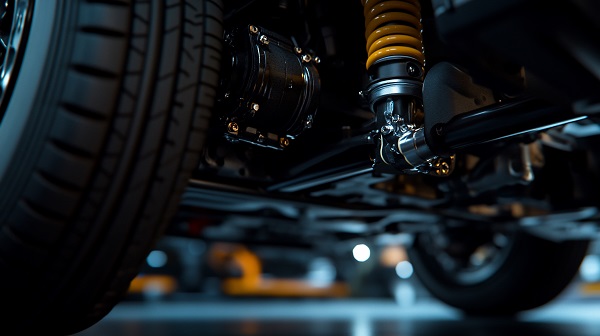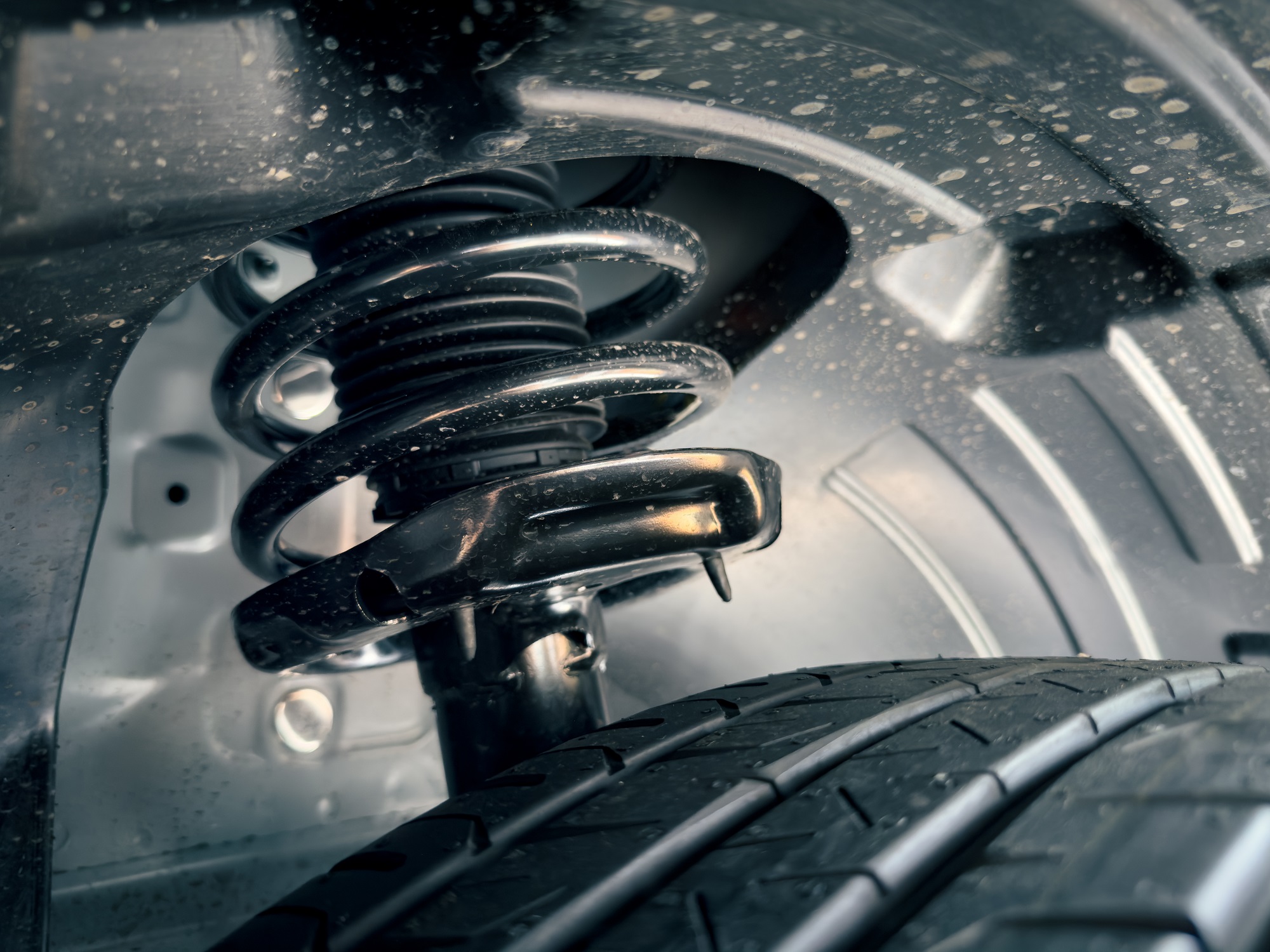Breaking Down the Basics: Key Differences and Functions of Shocks, Struts, and Springs
To optimize your vehicle’s performance and safety, understanding the distinct roles of shocks, struts, and springs is vital. Shocks control and dampen spring motion, converting kinetic energy to heat and reducing vibrations. Struts merge shock absorption with structural support, often incorporating a coil spring for efficiency. This combination supports vehicle weight and enhances stability. Springs primarily bear the vehicle’s weight, absorbing road impact, with the spring rate determining their compression capability and ride height management. Each component plays a unique role in your vehicle’s handling. By exploring further, you’ll see how these parts work in unison to improve ride quality.
Importance of Suspension Components

Suspension components are critical in ensuring your vehicle’s stability and handling, making them indispensable for safe driving. Shocks and struts act as vital elements, absorbing impacts and managing the weight of the vehicle.
They prevent excessive bounce and sway, which enhances ride comfort and maintains tire contact with the road. This interaction is crucial for optimal traction and steering responsiveness.
Properly functioning shocks and struts not only absorb road impacts but also protect the vehicle’s structural integrity. They play a pivotal role in wheel alignment, reducing tire wear and improving fuel efficiency.
Regular maintenance of these components ensures that your vehicle remains safe, minimizing body roll and the risk of accidents. Always prioritize suspension health for a reliable driving experience.
Overview of Shocks
At the heart of your vehicle’s suspension system, shocks, or shock absorbers, effectively manage and dampen the movement of springs, ensuring ride comfort and stability.
These hydraulic devices convert kinetic energy from road bumps into thermal energy, reducing vibrations felt by the vehicle’s chassis and occupants. By maintaining tire contact with the road, shocks are crucial for optimal vehicle handling and safety, especially during dynamic driving conditions.
Key components include a piston, piston rod, and hydraulic fluid, which regulate suspension movement by controlling fluid flow through orifices.
Regular inspection and maintenance are vital, as shocks typically require replacement every 50,000 miles or less, depending on driving conditions. Properly functioning shocks enhance both safety and performance.
Do You Need Suspension Service?
Don’t compromise your safety on the road; contact us today for reliable service and peace of mind. Your vehicle’s performance depends on a well-maintained suspension system.
Understanding Struts
In the realm of vehicle suspension systems, struts play a pivotal role by combining shock absorption with structural support.
You’ll find that struts integrate the functions of a shock absorber and a support element, crucial for maintaining tire alignment and absorbing road impacts. Unlike traditional shocks, struts bear a portion of the vehicle’s weight, enhancing the suspension system’s structural integrity.
Typically, struts include a coil spring surrounding the damping unit, offering a compact setup that’s efficient for independent suspension systems.
If struts wear out, you’ll notice reduced vehicle stability, compromised handling, and increased tire wear due to misalignment and poor shock absorption.
Thus, struts are essential for ride comfort, handling performance, and overall vehicle control.
Role of Springs
While springs might initially seem like simple components, they play an indispensable role in your vehicle’s suspension system by supporting its weight and absorbing road shocks, ensuring a comfortable ride.
Springs, including coil springs, work alongside shock absorbers to maintain stability. The spring rate is critical, reflecting how much weight is needed to compress the spring by an inch. Higher spring rates can support more weight but might lead to a stiffer ride.
Coil springs, with their thicker diameter, are common in many vehicles due to their ability to handle varied weights. Selecting the correct spring rate is essential to prevent issues like reduced ride height and excessive bumpstop contact, ensuring your suspension system functions optimally.
Shocks Vs. Struts
Understanding the differences between shocks and struts is key to grasping how your vehicle’s suspension system works.
Shocks, or shock absorbers, are vital for controlling the movement of the suspension system’s springs. They manage bounce, roll, and sway, maintaining tire contact with the road. Unlike struts, shocks don’t support the vehicle’s weight; they function as oil pumps to stabilize suspension dynamics.
Struts, however, are integral structural components that incorporate a coil spring. They provide dual functionality: damping motion and supporting vehicle weight.
Struts replace upper control arms and ball joints, ensuring stability and proper wheel alignment. While both shocks and struts enhance ride quality, their roles differ. Shocks focus on motion control, whereas struts contribute to structural integrity and suspension geometry.
Impact on Vehicle Handling
Properly functioning suspension components are crucial to maintaining optimal vehicle handling. Shocks and struts play a pivotal role in ensuring tire contact with the road, directly impacting stability.
By controlling body roll, sway, and brake dive, they enhance driver control, mitigating rollover risks during sharp turns. The suspension system’s efficiency minimizes vibrations, offering a smoother ride and improved comfort.
If shocks or struts wear out, expect excessive body movement, which undermines steering response and handling performance.
Upgrading or tuning these components can greatly improve traction and cornering, benefiting both on-road and off-road handling.
In essence, maintaining your suspension system isn’t just about comfort—it’s about ensuring precise, responsive vehicle handling under various conditions.
Types of Suspension Systems
In maintaining optimal vehicle handling, selecting the right suspension system is key to achieving desired ride characteristics.
An independent suspension enhances handling and comfort by allowing each wheel to move separately, minimizing vibrations and increasing stability during turns. If you’re seeking superior control and comfort, consider a multi-link suspension, which employs multiple arms to connect the wheel hub to the chassis, common in luxury and high-performance vehicles.
For a cost-effective solution, MacPherson strut suspension integrates shocks and springs into a single compact unit, ideal for passenger cars.
Solid axle front suspensions, typically used in heavy-duty trucks, offer durability by moving both wheels together.
Lastly, air suspension systems adjust ride height through air-filled springs, optimizing comfort and handling based on load conditions.
Maintain Your Suspension Components with Springs Brake and Suspension
Many drivers underestimate the importance of maintaining their suspension components, but ensuring these parts are in optimal condition is vital for your vehicle’s performance and safety.
At Springs Brake and Suspension in Vancouver, WA, we specialize in comprehensive suspension services, ensuring your shocks, struts, and springs are functioning at their best. Our professional technicians use advanced equipment to perform alignment services, crucial for maintaining optimal suspension system performance and even tire wear.
We also offer control arm and bushings replacement, shock absorber replacement, and strut repairs. Regular inspections help detect issues early, ensuring vehicle stability and control.
Benefit from a 2-year/24,000-mile nationwide warranty and complimentary brake and suspension inspection with every service. Schedule an appointment today for unparalleled service.
Auto repair services we provide
- Brake Repair in Vancouver: Our inspections and maintenance can help identify worn-out brake pads, damaged rotors, or fluid leaks before they lead to more significant issues.
- Lift Kit Installation in Vancouver: Enhance your vehicle’s off-road capability and aesthetics with our professional lift kit installation.
- Power Steering Repair in Vancouver: Our power steering repair services diagnose and fix issues with your steering system.
Meet the Owner: Sean Miller

Sean Miller is the dedicated owner of Springs Brake and Suspension, a local auto repair shop known for its exceptional service and expertise. Prior to acquiring the business, Sean gained valuable experience working with Fortune 500 companies and federal governments, developing innovative business models, while also running a successful auto detailing venture as a hobby. His strong business skills and a genuine commitment to customer satisfaction have made Springs a go-to spot for both car enthusiasts and everyday drivers. Outside of work, Sean enjoys attending car shows, exploring new automotive technologies, and mentoring aspiring entrepreneurs, all of which reflect his relentless passion for the automotive industry. At Springs, he applies his extensive knowledge and hands-on management style to optimize operations and enhance customer interactions, ensuring that every client feels valued and informed about their vehicle needs. With a focus on efficiency and service excellence, Sean fosters a welcoming environment, cultivating a community of satisfied customers who trust Springs Brake and Suspension for all their automotive requirements.
Do You Need Suspension Service?
Don’t compromise your safety on the road; contact us today for reliable service and peace of mind. Your vehicle’s performance depends on a well-maintained suspension system.

